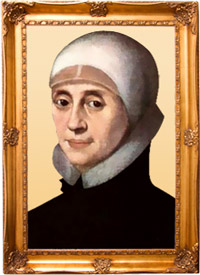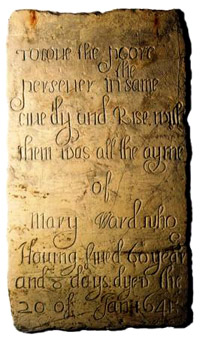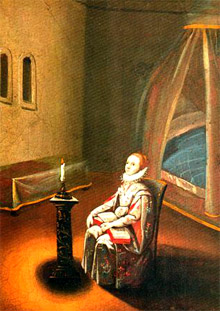 Born into a Yorkshire Catholic recusant family in 1585 Mary Ward was remarkable
for being among the first women to believe that women should be actively involved
in the apostolic life of the Catholic Church. However, initially she opted for the
strictest form of contemplative religious life determined to give herself totally
to God.
Born into a Yorkshire Catholic recusant family in 1585 Mary Ward was remarkable
for being among the first women to believe that women should be actively involved
in the apostolic life of the Catholic Church. However, initially she opted for the
strictest form of contemplative religious life determined to give herself totally
to God.
When God revealed to her that a life of prayer and obscurity behind a convent wall
was not what she was called to she returned to London in 1609. Here with a group
of like-minded young women she engaged in apostolic work disregarding the strict
laws against Catholics at the time. Later that same year Mary realised that God
was calling her to some form of religious life “more to his glory” To discern what
it was she left London for Flanders with her young companions and founded her first
house at St Omer.
In 1611, when at prayer, enlightenment came to her and she heard clearly the words:
‘take the same of the Society’ by which she understood the ‘Society of Jesus’ founded
by St Ignatius of Loyola. The rest of her life was to be spent in developing a congregation
of religious women on the Ignatian model for which she needed, and failed to gain,
papal approval.
Three times she and her companions walked to Rome from Flanders, twice to try to
gain this approval and the third time as a prisoner of the Inquisition following
the suppression of her congregation by Pope Urban VIII in 1631. During this period
she founded houses and schools in Liège, Cologne, Rome, Naples, Munich, Vienna,
Pressburg and other places, often at the request of the local rulers and bishops,
but papal approval eluded her.
To the Papal authorities a congregation of apostolic, unenclosed women was conceptually
a step too far at a time when the reforms of the Council of Trent had forbidden
new religious congregations and confined religious women to enclosure. Had she been
prepared to compromise and accept a form of enclosure Mary might have obtained papal
approval. However, she would not compromise and preferred to face the dissolution
of her congregation, imprisonment, the imputation of heresy, and disgrace rather
than abandon her conviction that “there is no such difference between men and women
that women in time to come will do much”.

Summoned to Rome in 1632 to face charges Mary was granted an audience with the Pope
at which she declared: “Holy Father, I neither am nor ever have been a heretic”.
She received the comforting reply: “We believe it, we believe it”. No trial ever
took place, but Mary Ward was forbidden to leave Rome or to live in community.
In 1637 for reasons of health Mary was allowed to travel to Spa and then on to England.
She died during the English Civil War just outside York on January 30th 1645. She
is buried in Osbaldwick Anglican churchyard close by.
Mary Ward's Spirituality
Mary Ward’s spiritual journey led her from childhood piety, to the enclosed contemplative
life of the Poor Clares, to the Ignatian practice of finding God in all things –
through joy, through searching, through suffering, through misunderstanding, and
through disgrace – to the depths of mystical union with God.
Mary’s deep desire was to join the strictest contemplative order, and in 1606, following
six years of opposition from her parents, Mary sailed to Flanders where she entered
the Poor Clares. She was assigned a place with the lay sisters, which meant begging
on the streets, rather than singing divine office in choir. Advised to leave this
convent Mary helped to found a Poor Clare monastery in Gravelines where for two
happy years she lived the contemplative life she had sought. However, God had ‘some
other thing’ for her.
 Finding God in all things came naturally to Mary Ward. One day in 1609 whilst in
London doing her hair in the morning she fell into an ecstacy and for two hours
could hear only the words: ‘Glory, glory, glory’. She understood that whilst she
did not yet know what God had in mind for her, it would be to God’s greater honour
and glory. Two years later, in a similar enlightenment, she heard distinctly the
words ‘take the same of the Society’ understanding this to be a call to found a
religious congregation of women on the model, but separate from, the Jesuits.
Finding God in all things came naturally to Mary Ward. One day in 1609 whilst in
London doing her hair in the morning she fell into an ecstacy and for two hours
could hear only the words: ‘Glory, glory, glory’. She understood that whilst she
did not yet know what God had in mind for her, it would be to God’s greater honour
and glory. Two years later, in a similar enlightenment, she heard distinctly the
words ‘take the same of the Society’ understanding this to be a call to found a
religious congregation of women on the model, but separate from, the Jesuits.
From this moment at the age of 26 her search was over. The rest of her life would
be spent in striving to put into effect what she was certain God was asking of her.
She never wavered in the face of doubt, opposition, hostility, poverty, suppression,
imprisonment and disgrace. As her problems mounted so did her trust in God and her
magnanimity in forgiving her enemies. Even when imprisoned by the Inquisition she
could write to her companions: “Be merry and doubt not our Master”
From her early twenties Mary Ward was familiar with the Spiritual Exercises of St
Ignatius and chose a Jesuit as her spiritual guide. A deep spiritual insight in
1615 known as the ‘Just Soul’ vision helped her to realise that her original desire
for the contemplative life was perfectly compatible with the active, apostolic ministry.
God was to be found in all things.
Spirituality is essentially about how we see, experience, and respond to the world
in which we live, and to God’s presence in it. Every religious congregation has
a spirituality that reflects the spirituality of its founder.
Mary Ward, a woman close to God, wished to found an apostolic congregation modelled
on that of the Jesuits. For the Jesuits, and therefore for us, the key experience
is that of the Spiritual Exercises of St Ignatius.
These Spiritual Exercises, one of the most influential spiritual texts ever to have
been written, grew out of the spiritual experience of the young Ignatius of Loyola.
Ignatius came to realise through these experiences that God’s presence is to be
found in the inner movements of the Spirit. By learning to listen and feel with
profound attentiveness the desires God has for each one of us we can enter into
a unique relationship with our Creator and ‘find God in all things’. Simultaneously,
the individual making the Spiritual Exercises with great generosity of heart will
feel impelled by love to offer him or herself to the service of God in mission.
Mission, the service of others, lies at the very heart of our spirituality.
Mary Ward was led into paths unknown for women of her time by her attentiveness
to the movements of the Spirit and her experience of discerning love. We hope to
follow in her footsteps and in this way aspire to ‘find God in all things’ or, as
Mary Ward would have put it, ‘to refer all to God’.
Mary, led by the Spirit, believed that women should not be afraid to take new paths
in the service of the Church, and be open and ready to respond to the signs of the
times where the need is greatest. Discerning the greatest need is only possible
where there is attentive love, disponibility of spirit and freedom from fear.
The Constitutions of the Congregatio Jesu are those of the Society of Jesus adapted
for women. In them the members of Mary Ward’s congregation find inner strength and
an understanding of what it means to be focussed solely on the ‘greater honour and
glory of God’. If we live the Spiritual Exercises and the Constitutions as Mary
Ward lived them we will come to understand what it means to be ‘a contemplative
in action’ ready to be sent on universal mission.